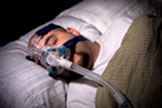CPAP Sleep Apnea Masks

You will find a number of sleep apnea masks from which to choose for your CPAP (continuous positive airway pressure) therapy. Yet, finding a comfortable mask that meets your needs is key.
Studies show that up to 50% of sleep apnea sufferers don't use their equipment. Discomfort from face masks and headgear is cited as the most common reason for avoiding use.
Considering that continuous positive airway pressure is the number-one treatment for sleep apnea, and has proven to be extremely effective when used correctly, making the sleep apnea mask as comfortable as possible is essential.
If you take the time to do your research and get the best possible fit when choosing between sleep masks, your treatment is much more likely to be successful.
Types of Sleep Apnea Masks
- Nasal Mask
Fits over your nose and delivers air through your nasal passages. - Oral Mask
Fits over your mouth and delivers air through your mouth. This mask is optimal those who are nighttime mouth breathers. - Full Face Mask
Fits over both your nose and mouth, delivering air to both. If you have claustrophobic tendencies, it may not be your best choice. - Nasal Pillows
This variation isn't actually a mask as such. Instead, it consists of small, nasal inserts that deliver the air directly into your nasal passages.
All of the above masks are connected to some sort of headgear, which in turn connects to a flexible hose attached at the other end to your sleep apnea breathing machine.
Both the masks and headgear can vary in size, shape, and material. There are many different manufacturers of CPAP equipment, and each have their own range of styles, features, and options.
Tips for Choosing a CPAP Face Mask
One of the most important things that affects the efficiency of CPAP is how well the mask fits your face. If it's not a snug fit, and is either too loose or too tight, there will be air leaks. These will prevent your sleep apnea machine from achieving the correct air pressure to relieve your symptoms.
Adjustable straps hold the mask in place, and the position of these can vary between products. Optional chin-straps are also generally available.
Masks consist of a hard plastic shell with softer silicone around the edges that fit closely to your face. Some models feature more flexible shells made of gel or foam-type material that can be molded to fit to the contours of your face. CPAP masks may also come with gel cushions, nasal pillows, and other features.
Getting Comfortable
Some people find that particular styles or models of masks cause skin irritation. Chafing is a common complaint and makes wearing the CPAP mask uncomfortable. To help sensitive skin and alleviate pain from irritation, apply a moisturizer or lotion to the contact points where the mask touches your face.
If you experience dryness or irritation in your nose or eyes, caused by the airflow from your sleep apnea machine, try using saline nose sprays, special CPAP nasal moisturizers, and/or eye drops to relieve the symptoms.
Conclusion
If you take your time to choose your sleep apnea mask, and know how to take care of any minor irritations that come up, you will be able to get the maximum benefit from CPAP therapy.
This means you'll be able to break free from the health risks and misery caused by your sleep apnea - and finally get the sleep you need.
Related Information - Sleep Apnea Masks
More About Sleep Apnea Masks
CPAP Mask Buying Tips
Wearing a CPAP Mask
Full Face Masks
CPAP Nasal Masks
CPAP Equipment Overview
Sleep Apnea Treatments
Sleep Apnea Machine
Share Sleep Tips Do you have a great tip to share with others who are struggling with sleep? What works for you might help someone else. |



